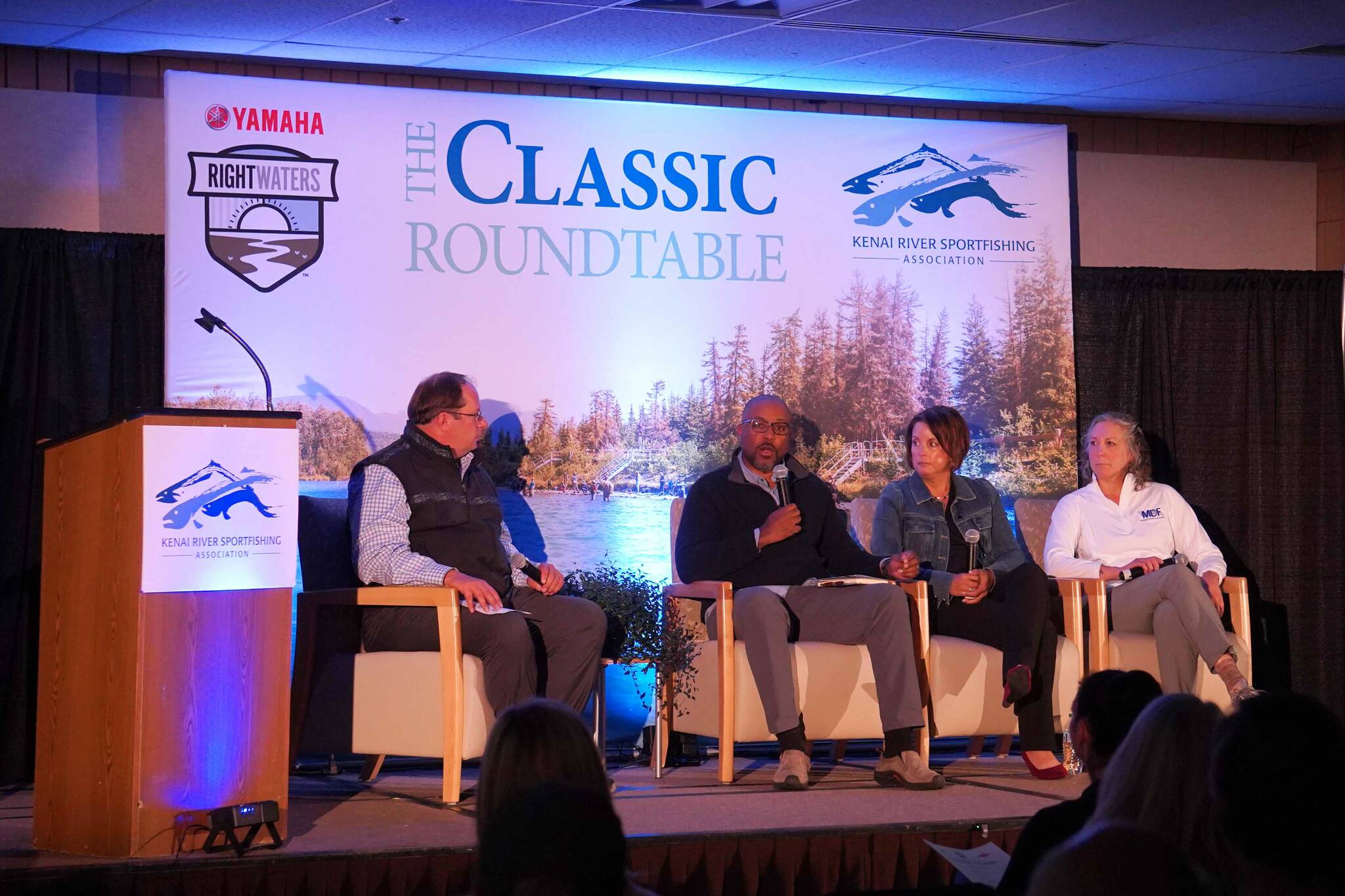The Kenai River Sportfishing Association’s annual Kenai Classic Roundtable last month drew political figures, including local, state and federal officials, fisheries experts and community members to talk marine debris, marine mammals and Gulf of Alaska king salmon.
KRSA Executive Director Shannon Martin billed the Aug. 21 event as an opportunity to hear from “Alaskans and also experts and leaders from the Lower 48,” shedding light and sharing knowledge on fisheries. The conversations, she said, aren’t unique to Alaska.
Kevin Delaney, senior fishery management consultant for KRSA and former director of the Division of Sport Fisheries in the State Department of Fish and Game, opened the roundtable with an overview of salmon management from the 1970s to the present day. Ultimately, he said, the understanding of the local stocks has grown leaps and bounds over those decades, and overharvested stocks have been able to see a resurgence as ocean conditions have fluctuated.
“One thing I’ve learned over the years, the fish are in charge,” he said.
Sen. Dan Sullivan shared an update on his legislative efforts on fisheries. Alaska, he said, is the “superpower of seafood.” He discussed, among other topics, efforts to block importation of Russian seafood in America and beyond; establishment of the Alaska Salmon Research Task Force, which in July published its first report; and the American Fisheries Advisory Committee Act, which creates a series of committees that will direct grant funding through the National Oceanic and Atmospheric Administration for fisheries research and development.
Sullivan also spoke against the National Marine Fisheries Service’s positive finding on a petition to list Gulf of Alaska king salmon under the Endangered Species Act. That move, he said, was “meritless” and could harm Alaska’s economy and fisheries.
That finding was the center of one of the roundtable’s panels, where Delaney was joined by Dani Evenson, a policy advisor for the State Department of Fish and Game. Evenson said that the petition seeks to list all king salmon that spawn in the Gulf of Alaska, a “massive area” that includes the Kenai Peninsula, and was started by the out-of-state environmental group Wild Fish Conservancy.
The positive finding, she said, opens a public comment period and starts a yearlong status review of the species. It means that they believe the petition provides “substantial information” that a listing “may be warranted,” Evenson said.
“This has the potential to affect just about every fishery in the Gulf of Alaska,” Evenson said. “Even those that don’t target chinook.”
The Gulf of Alaska kings in question, Evenson said, “are not in peril, much less critically or chronically imperiled.” Though king salmon failing to meet escapement goals is cause for concern, Evenson said the salmon stocks “are not at critically low levels where the long-term viability of any stock is imperiled.” Evenson said that contrary to claims made in the petition, there’s no evidence that the stocks are being overharvested; no evidence of habitat being destroyed by logging, mining and other development; and no evidence of diseases that are originating in hatcheries being transmitted to wild stocks and driving mortality.
State management, Evenson said, is up to the task of responding to declining king salmon abundance.
“We recognize things are not rosy,” she said. “The state is taking aggressive action to protect these stocks — some of which are very painful for Alaskans. We’re doing this to ensure that, when ocean conditions become more favorable, we can have healthy and robust fisheries.”
Evenson said that the state would be commenting on the finding before an early September deadline, and that they successfully requested that two state experts be included on the review team — though she noted that those experts were given non-voting seats and won’t be allowed to write a minority opinion if the service decides to list the kings.
Other panels during the roundtable covered efforts to combat marine debris and the impact of the Marine Mammal Protection Act.
Larry Phillips, Pacific Fisheries policy director for the American Sportfishing Association, said the Marine Mammal Protection Act has led to a massive increase in the population of California sea lions that eat salmon. A potential response, he said, is increased subsistence harvest by Alaska Natives.
Closing remarks were delivered by Rep. Mary Peltola, who said that while some fishing issues are simple, they’re made complex by the size of Alaska and the diversity of its fishers and user groups. But, she said, all of those fishers are interested in sustainability.
“We’re elevating fish to a real national discussion,” Peltola said. “On fish, we can’t do enough, and we can’t do it fast enough.”
For more information, find the “Kenai River Sportfishing Association” on Facebook. A full recording of the Kenai Classic Roundtable can be found on their YouTube channel.
Reach reporter Jake Dye at jacob.dye@peninsulaclarion.com.

